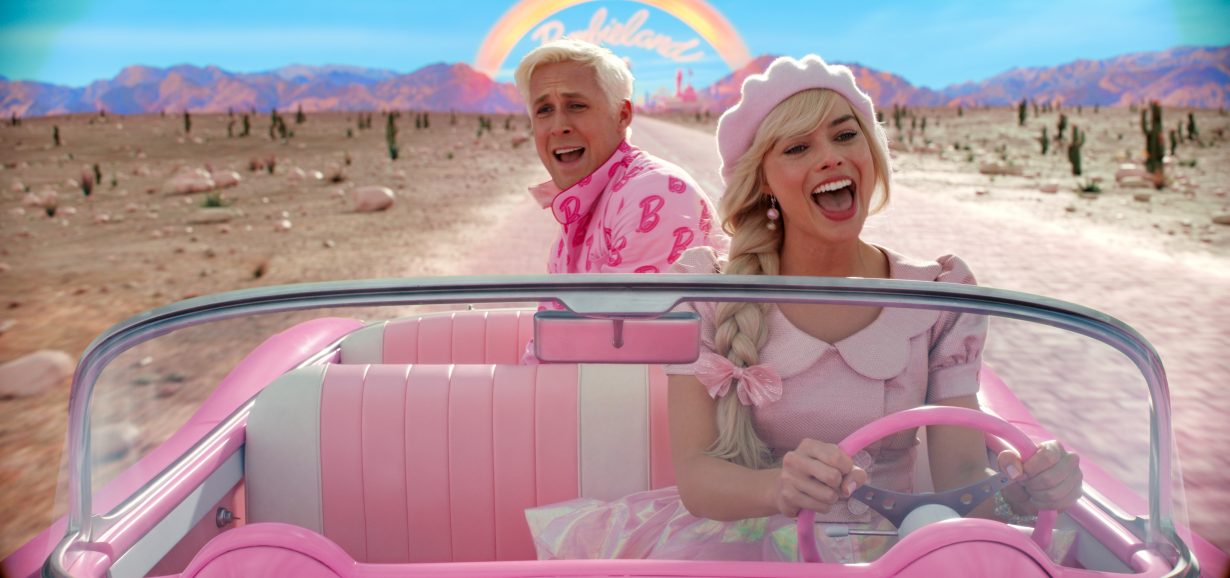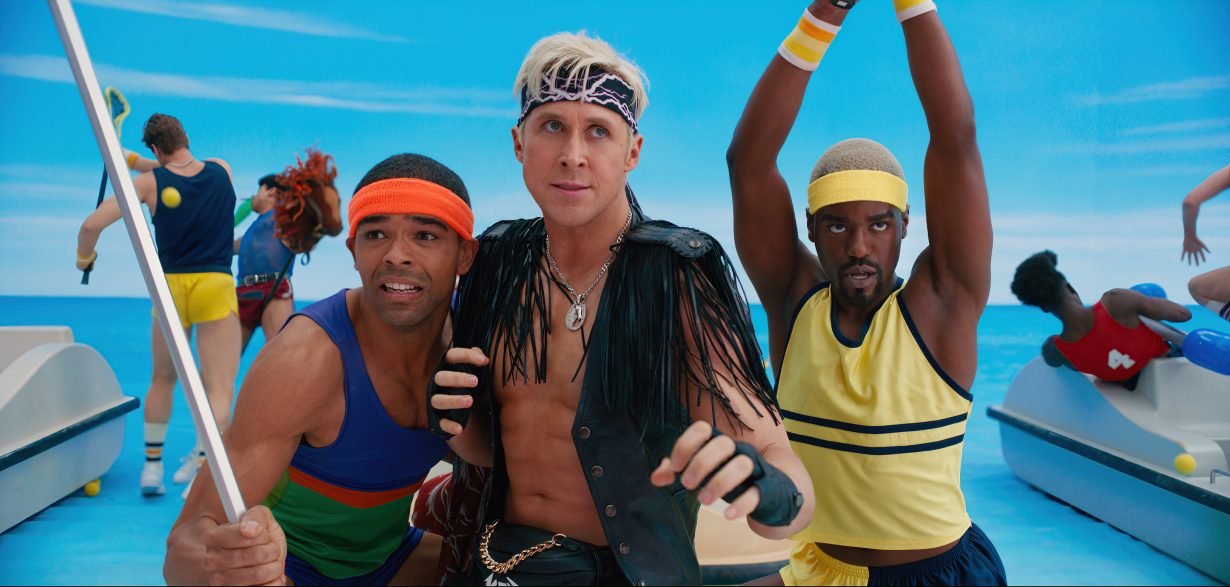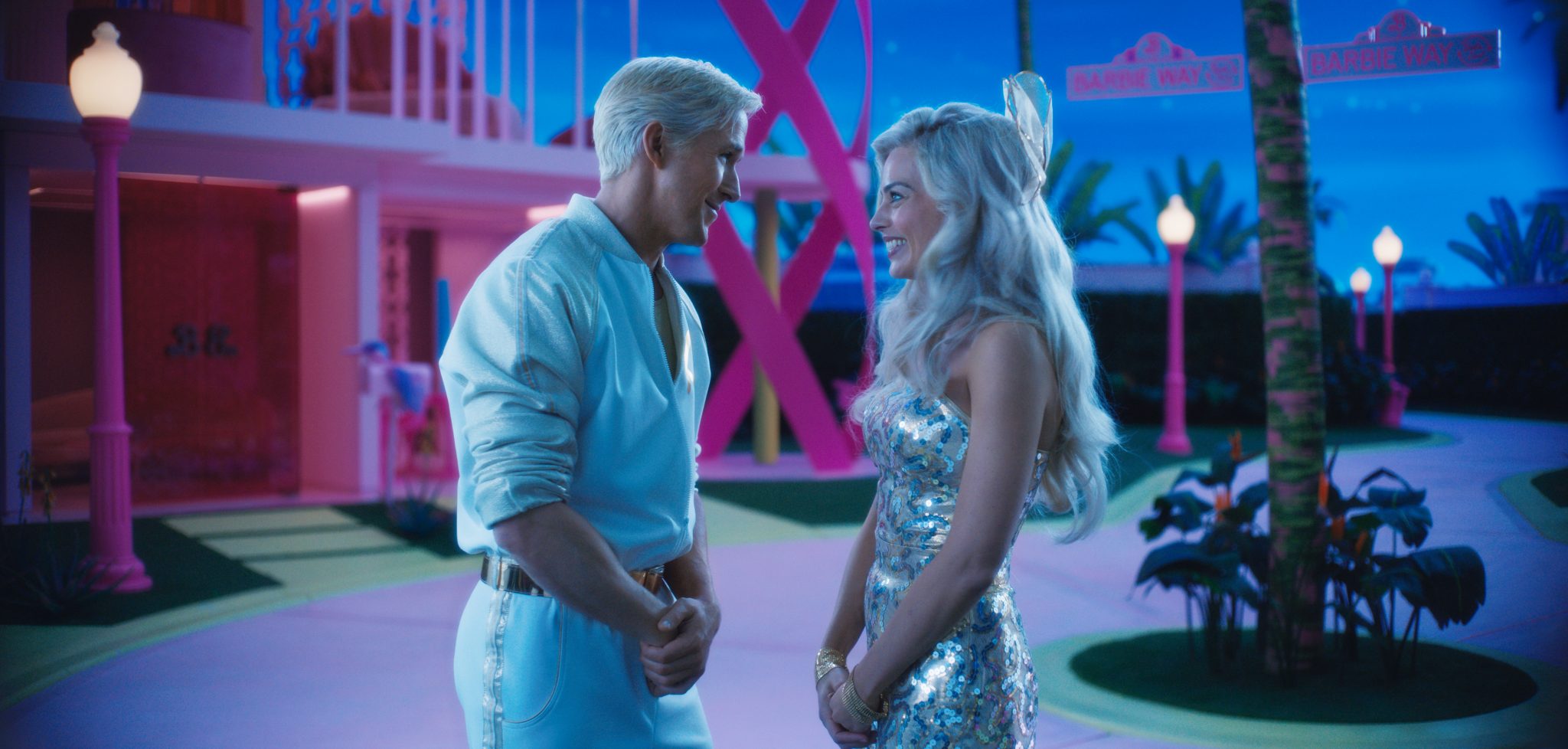A blend of silliness and seriousness is Barbie’s calling card – and adulthood, as seen by a child, can seem simultaneously dumb and intense, too
Greta Gerwig’s Barbie is an inventive, eccentric, sometimes riotously funny comedy-satire with a fairly heavy-handed feminist agenda; it is also a two-hour advertisement for a doll endorsed by an enormous global corporation, aimed primarily at tweens. Per its worldview – and per the lived experience of most, if not all, women – the ability to hold two contradictory ideas in one’s mind at once is a defining aspect of feminine life, ensuring that the movie has baked into it a kind of get-out clause regarding its own commercial subtext. Watching it, I thought of a passage from Patricia Lockwood’s 2021 novel No-One is Talking About This: ‘Capitalism! It was important to hate it, even though it was how you got money. Slowly, slowly, she found herself moving toward a position so philosophical even Jesus couldn’t have held it: that she must hate capitalism while at the same time loving film montages set in department stores.’ This is, in a sense, the philosophical position adopted by Barbie: Barbieland, a dazzling fantasia that is so gorgeously set-designed it’s almost difficult to look at, is its own kind of department store, and Gerwig lets us revel in its loveliness even as the screenplay she has written with her partner, Noah Baumbach, has characters describe Barbie as a “fascist”, or accuse her of enforcing “sexualised capitalism”. Womanhood under the patriarchy! It is important to hate it, even when it is how you get money!
Plot-wise, Barbie is a hot-pink hero’s journey, or a coming-of-age-story in which the protagonist is simultaneously ageless and somewhere near her mid-thirties. Stereotypical Barbie (Margot Robbie), a blonde knockout with a neat line in coordinated clothing, wakes up every day in Barbieland – a matriarchy that has both a female President (Issa Rae) and an all-female Supreme Court – in a Dream House with no walls, the whole neighbourhood functioning like an adorable panopticon, or like a less sexually-threatening version of that Jenny Holzer text about the motel. Because she is perfect, every day is perfect; because this is Barbieland, all of her friends hail each other with “hey Barbie!” every day on the way to their Very Serious Jobs as astronauts and doctors, after a morning spent ‘showering’ without water, ‘eating’ without food and ‘drinking’ without liquids. (I presume that this is what The Wing was like when it was active, although since I do not live in New York and am not really the kind of person who would join a members’ club for girlbosses, I cannot know for sure.)
Men are purely decorative in Barbieland and, with the exception of one lovely dork named Allan (Michael Cera), they are all called Ken. The crisis that spurs Barbie into action is the sudden appearance of several all-too-human imperfections in Stereotypical Barbie, including flat feet, a patch of cellulite and intrusive thoughts of death. For most of us, this sounds a lot like a Tuesday; for the world’s most famous and most flawless doll, it is reason enough to upend her life and head out on an Odyssey into the unforgiving real world, in search of the human girl who has been playing – perhaps not very nicely – with her plastic mirror-self.


Truthfully, during the endless bombardment of its pre-publicity cycle, I had wondered whether Barbie might collapse entirely underneath the unsupported weight of its gigantic feminist ambitions like – well, you know what like. It is fair to say the film is least effective when it is being didactic, and thus overly simplistic, vis-a-vis its politics. Still, I’m not certain that its feminism is any less developed than that of, say, 2020’s Promising Young Woman, and Promising Young Woman was not – to my knowledge – written to be easily accessible to people under twelve. When Barbie meets her person, she is shocked to find a middle-aged Latina woman who works for Mattel, who has been playing with her daughter’s doll in order to cope with her unfulfilling life.
The mother, Gloria, is played by America Ferrera, an objectively attractive person who is best-known to millennials for playing the titular role in Ugly Betty, and her casting has to be intended as a deliberate reminder of the kind of idiotic noughties body fascism that led to ‘ugly’ being synonymous with ‘wears glasses and weighs over ninety pounds’. At one point, Gloria unleashes a monologue about the maddening expectations placed on women by society, and the whole thing sounds more like the introductory lecture of a Feminism 101 course than it does like human speech. As a weary, childless thirtysomething, I have to confess I cringed a little; had I been attending with a preteen daughter, I might have taken a less cynical view. If nothing else, Barbie will encourage an entire generation of young women to decline when a man offers to tediously play acoustic guitar ‘at’ them, not for them, and I think that’s sort of beautiful. My inability to fully square its status as an IP tie-in with its ideological viewpoint has done little to diminish my enjoyment of it as a glittering romp – a fizzy, glorious bit of fun with a wonderful ear for the kind of pithy, throwaway one-liners one too rarely hears in movies since the dawn of the ‘so that just happened’ era. For all of its visual bombast, too, it knows that Barbieland’s peppy, privacy-free femmetopia is a little creepy, and that a frictionless life is not one that is necessarily worth living.


In other words, it is more obviously a film by Greta Gerwig than it might seem at first glance. The director has suggested that one scene from early on in Barbie’s trip into real life (which plays out, with a humorous flourish, in the unreal surrounds of LA) was essential to her vision, and that if the studio had removed it from the screenplay, she might not have made the film. It lasts for barely a minute: Barbie, in a bright pink cowgirl outfit, sits next to a woman at a bus stop who is maybe eighty-five or ninety. “You’re beautiful”, Barbie says, never having seen a person of this advanced age before, and the openness of Margot Robbie’s face assures us that she means it. “I know that”, the older woman nods, briefly putting down her newspaper to grin. The moment ought to be terribly schmaltzy, but much like the rest of Barbie’s time spent interacting with reality, it plays directly into one of Gerwig’s strengths: her willingness to be earnest about what it is to progress through life as a woman, pointing out the various joys and terrors with such rapture that she might as well be a bright-eyed, newly-born doll.
Barbie’s move into our world plays a lot like the transition each of us makes from childhood to adult life, everything revealing itself to be scarier, stranger and less simple than we had at first imagined. She feels “violence” in the gaze of men; she learns that men and women are not equal; she begins to recognise the pleasure and privilege of ageing, even as she also realises it heralds death. These are big themes for a movie that features a cameo by Earring Magic Ken, but this blend of silliness and seriousness is Barbie’s calling card – and adulthood, as seen by a child, can seem simultaneously dumb and intense, too.

Speaking of Kens: there is a certain irony in the fact that for all of Barbie’s anti-patriarchal proselytising, the whole film is ultimately stolen by a man. For the ten or fifteen of us who watched 2016’s criminally overlooked The Nice Guys, it will come as no surprise that Ryan Gosling is a brilliant comic actor; here, he puts in such a spectacular performance as a doofus that one has to wish the Academy had a category for Best Supporting Himbo. His particular blend of vacuity and overconfidence is larger-than-life, but not so much larger that it is impossible to picture being caught talking to his Ken in line for the watercooler at the gym, or at the wedding of a cousin that you hate. He cries like a toddler, preens like a jock and talks like a man who literally does not have a brain. Much has been made of the fact that Ken, with his growing unease at the realisation that he is a permanent supporting character for Margot Robbie’s Barbie, is effectively the proxy for the typical girl-sidekick in a movie, and this does ring true; equally interesting, though, is the necessarily neutered way that patriarchy is portrayed when Ken, delighted to find that men rule the real world purely by virtue of being male, decides to bring it back to Barbieland and establish the “Kendom”. On a technicality, all Kens might be incels, owing to the fact that none of them have genitals. Their newfound self-love focuses heavily around admiring, or pretending to ride, horses, which Gosling’s Ken refers to Freudianly as “man extenders”. Somebody could no doubt write a PhD on the way Barbie manages to bring the very worst parts of heterosexual life into the picture, including sexual harassment and men’s rights activism, while leapfrogging the actual sex. Do note, though, that the last line of the movie is a joke about biology that is funny, weird and wholly unexpected – Ken may decide he is “Kenough”, man extender or no man extender, but it ends up being Barbie who gets the last word, and a little more besides.
Philippa Snow is a writer based in Norwich, UK. Her reviews and essays have appeared in The New Republic, Sight & Sound and The White Review, among others. She is the author of Which As You Know Means Violence (2022) and the forthcoming Trophy Lives: On the Celebrity as an Art Object
